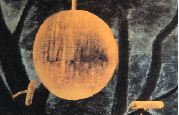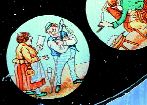

Words, in the hands of a poet, create a sensory experience more akin to music or art than literature. "Poetry is a tactile medium," says Peter Gizzi, widely recognized as one of the country's most powerful young poetic voices. "Look at a painting. What we admire about a Van Gogh sunflower is how he pushes yellow and green together along this rough, three-dimensional surface. We're admiring his brush strokes, what he does with the actual paint, not the flower.
 "In
poetry it's the same thing. We aren't struck by what Shakespeare has
to say but how he says it. What 'takes the top of our heads off,' to
quote Emily Dickinson, is the gesture of language--a lyrical moment
that weaves together cadence, sound, and syntax."
"In
poetry it's the same thing. We aren't struck by what Shakespeare has
to say but how he says it. What 'takes the top of our heads off,' to
quote Emily Dickinson, is the gesture of language--a lyrical moment
that weaves together cadence, sound, and syntax."
What are those sounds in the dark?--Another Day on the Pilgrimage
Most of us think of language in a utilitarian way--we use it to scan the aisle signs in our search for cereal or to reflect back on the events of the day with a loved one. A good poem, Gizzi says, disrupts such everyday usage.
 "Poetry
is not about information; it's about communicating messages in a more
ecstatic way. We know the distance between the sun and earth is 93
million miles, but we can't comprehend such a vast space. The act of
the poem is the act of trying to define that space."
"Poetry
is not about information; it's about communicating messages in a more
ecstatic way. We know the distance between the sun and earth is 93
million miles, but we can't comprehend such a vast space. The act of
the poem is the act of trying to define that space."
Gizzi, 39, has been defining poetic spaces for 11 years now, both
as a writer and a promoter of the work of others. An assistant
professor of literature at UCSC for the past three years, Gizzi
edited several critically acclaimed projects, including the poetry
journal o*blek (pronounced "oblique") and The Exact Change
Yearbook. In 1994 he received the prestigious Lavan Younger Poets
Award from the Academy of American Poets and, last summer, a coveted
Howard Foundation fellowship.  The
latter award came on the heels of the publication of his two latest
books, Artificial Heart (his second collection, published by
Burning Deck) and a critical work on poet Jack Spicer titled The
House that Jack Built (Wesleyan University Press).
The
latter award came on the heels of the publication of his two latest
books, Artificial Heart (his second collection, published by
Burning Deck) and a critical work on poet Jack Spicer titled The
House that Jack Built (Wesleyan University Press).
Inside the song, it's weirdglue tears, and a trail of crumbs
--Pierced
Poetry scares most of us. We think we don't get it. But "getting" a poem, Gizzi explains, is often as simple as reading it. "Poetry is not like a puzzle that you have to figure out; there's no sum total that's quantifiable to every reader. What you get out of a poem is what you're supposed to get."
 For
a poem to touch its reader, Gizzi says, it must leave spaces between
the words. He notes that stanza is Italian for "room"--readers
step into the poem on the words the poet furnishes, but are given
space to inhabit the room and find personal significance in what they
encounter there. As important as what is in the poem, Gizzi says, is
what's left out.
For
a poem to touch its reader, Gizzi says, it must leave spaces between
the words. He notes that stanza is Italian for "room"--readers
step into the poem on the words the poet furnishes, but are given
space to inhabit the room and find personal significance in what they
encounter there. As important as what is in the poem, Gizzi says, is
what's left out.
Like any work of art, a poem is meant to be experienced more than once. "My students often tell me they're done with an assignment after they've read a poem once, and I say, 'What do you mean you read it? I've been reading this poem for the last 20 years, and I'm still not done with it.' "
. . .to wander the tired stones againand worn teeth we remember to hold onto a world
--Tous les Matins du Monde
Detail Of Tripoli By Trevor Winkfield
Detail Of Map By Jasper Johns
|
Some poets drink, some scowl, some ride boxcars. It's not easy baring your soul for a living. Gizzi manages the act with a balance of self-effacement, humor, and devotion to the poetic past. "Poetry is an ancient practice, and when you write you are participating in a tradition," he says. A poet, Gizzi adds, writes in the company of the ghostly voices of past poets. "Poems are incredibly haunted. The act of writing a poem is a form of possession."
An idea for a poem can strike while he is on the phone or watching a movie or drifting off to sleep. The words Gizzi hears become detached from their context and take on the cadence, sound, and syntax that make a poet's heart beat faster.
"Poetry is finally about attention to detail," Gizzi says. "To be holy in small things. Everything is animated, singing all the time--if we just look." --Barbara McKenna |
TOUS LES MATINS DU MONDE
Goodness is hard on the body,
a distracted mind unable to doze in fitful sleep.
The dove rattles the mind into thinking
it has a body of thought--complete
& symbolic--the gray feathers perched
outside the pale cut square of silver.
Say then, we belong to that window,
that warble, and suddenly we belong too,
the silver car in the yard, even a tiny silver hammer.
All vehicles of travel
disclose the mind's need to wonder in perfect forms.
Even if the skiffsman don't come to this bed
to rock me to sleep--to wander the tired stones again
and worn teeth we remember to hold onto a world
for this life might not take us the whole way.
That shape of an idea, the concept, or donnée
travels farther than the instrument can register.
The spindle whirs beyond its order.
Something must be moving at incredible speed.
With pure speed I address you, reality.
Poems reprinted with permission from Artificial Heart, (1998, Burning Deck)
|
|
HOW TO CARE FOR A SMALL BIRD Given the baby bird crisis, what if having tumbled from its nest Two major problems evolve another preparing it for the wild But before you build try putting it back where it came Remember its fear, think of its shock beset in a hand moving through space |
|
Peter Gizzi Photo: Elizabeth Willis |
|


Detail of Son by Francesco Clemente
Photographs of sunflowers, details of artwork, and other personal objects in Peter Gizzi's home by R. R. Jones